Submitted:
05 October 2023
Posted:
09 October 2023
You are already at the latest version
Abstract

Keywords:
1. Introduction
2. Contextualising about the importance of intangibles in sustaining smallholder family-based broiler production
3. Material and Methods
3.1. Mainstream economic cost model
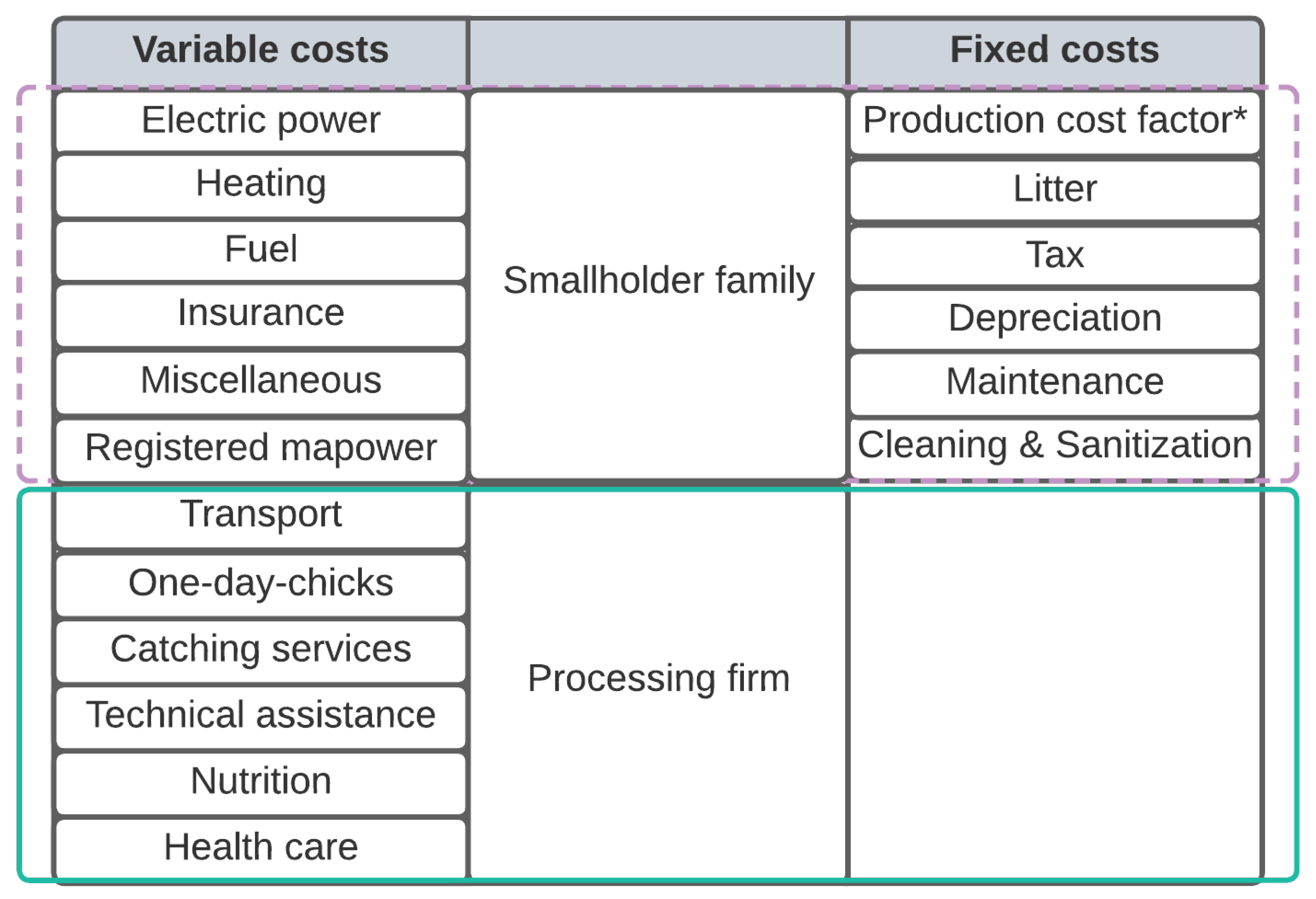
3.2. Alternative economic cost model: Emergy synthesis as a way to include the intangibles
3.2.1. Estimative of cultural information transformity based on the Emergy theory
3.2.2. Transformity assessment for the broiler smallholder service with and without cultural information
3.2.3. Estimative of a holistic view-based payment for the broiler smallholder by their services
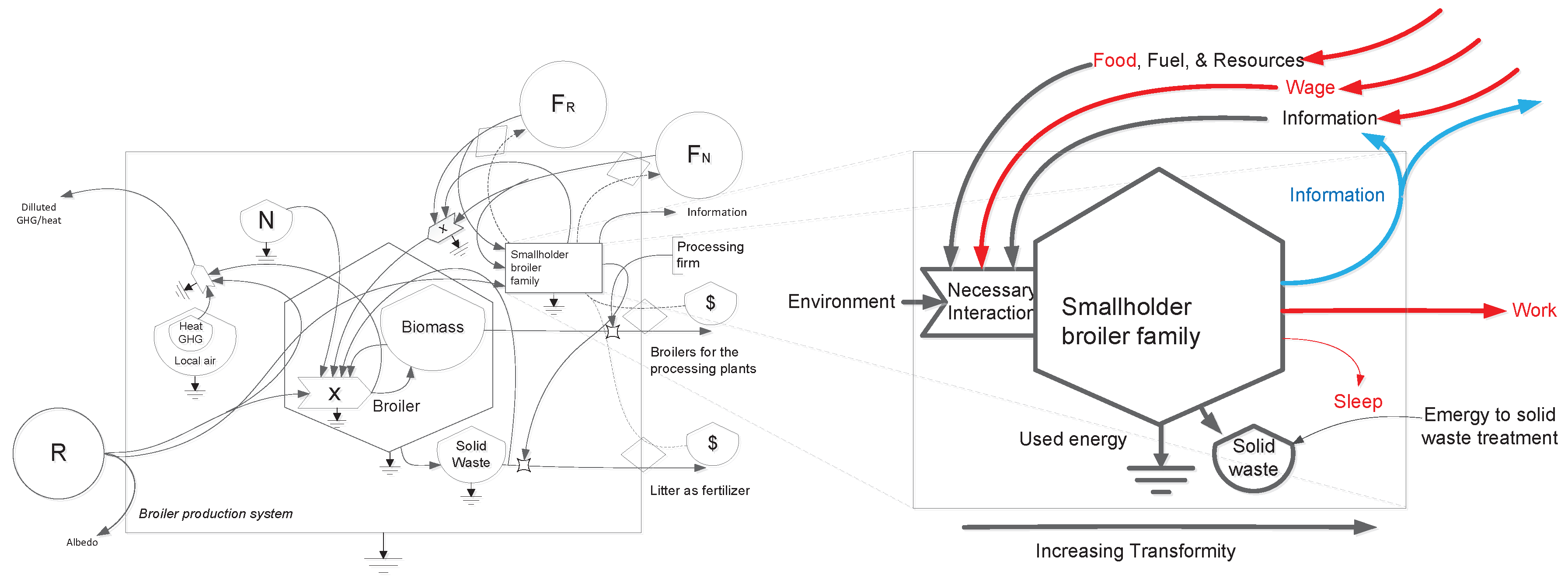
4. Results and Discussion
4.1. Valuing cultural information
| Solar | Em$Value | |||||
|---|---|---|---|---|---|---|
| Energy | Transformity | EMERGY | (emdollar/yr) | |||
| Item | Unit | (units/yr) | (sej/unit) | (sej/yr) | in millions | |
| Annual Flow | ||||||
| 1 | Renewable resource | J | 5.60 | 23,769.10 | ||
| 2 | Human metabolism | J | 2.71 | 2.06 | 5.60 | 23,769.10 |
| 3 | Information flow | J | 2.71 | 2.06 | 5.60 | 23,769.10 |
| Steady-state Storage | ||||||
| (sej) | (sej/J) | ( sej) | (emdollar) | |||
| in millions | ||||||
| 4 | Population | J | 2.02 | 9.13 | 1.85 | 784,380.31 |
| 5 | Culture information | J | 2.02 | 2.77 | 5.60 | 2,376,910.02 |
- 1 The Emergy of renewable resources for Santa Catarina State was obtained from data previously published by Demétrio [36].
- 2 Human metabolism.
- 3 Information flow:
- 4 Population:.
- 5 Culture information:.
4.2. Emergy synthesis of broiler smallholders
4.3. The impact of culture information on the broiler production Emergy indicators
4.4. The imbalance between the estimated economic-based and environmental-based payments
4.5. General insights into quantifying the value
- Market valuation: This form of valuation involves the analysis of prices and recent transactions of similar products or assets on the market. The idea is to use concrete data from real transactions to establish a value based on market conditions.
- Valuation by cost: This method aims to determine value based on production costs, including materials, labour, depreciation, operating expenses and other expenses. In the industry, the cost of production is a good indicator of the value of the product.
- The valuation of environmental costs based on Emergy (without services or information) uses only a physical inventory of the resources used in its accounting. This type of valuation takes into account the energy embodied in natural resources and considers their quantity and quality; Emergy makes it possible to assess the environmental costs associated with production. The Emergy valuation approach (without services and information) can be useful especially when the focus is on analysing the physical resources, production technologies and geographical aspects (such as rainfall and land use) involved in a given production system.
- The valuation of the environmental cost in Emergy with services (including the money paid in environmental accounting) offers a more comprehensive view and may be more appropriate when it is desired to understand the social, economic and environmental impacts of the organisation in a more complete and integrated way.
- Evaluating the “(eco)cost” in Emergy by including information can take into account scientific knowledge, technology, intellectual capital and culture, which are essential to the operation and functioning of production systems. Including information in the estimation of Emergy aims to reflect the contribution of these elements and allows for a more comprehensive assessment of the efficiency and sustainability of the production system. This approach is highly relevant in Emergy-based environmental accounting as it recognises that production depends not only on tangible physical resources but also on the knowledge, skills and information available. Therefore, Emergy-based environmental accounting that includes information seeks to understand and quantify both the physical and intangible aspects involved in the production and functioning of economic and ecological systems.
5. Conclusions
References
- Caldas, E.; Lima, A.; Lara, L. Viabilidade econômica da produção de frangos de corte sob diferentes estruturas de governança. Arq. Bras. Med. Vet. e Zootec. 2009, 71, 1639–1648. [Google Scholar] [CrossRef]
- Van Horne, P.L.M. Competitiveness of the EU Poultry Meat Sector, Base Year 2017 : International Comparison of Production Costs; 2018; Vol. 44;
- Talamini, D.J.D.; Santos Filho, J.I. dos Critérios Para o Cálculo Do Custo Operacional e Da Rentabilidade Do 11 Produtor Integrado de Aves e de Suínos No Brasil; Concórdia, SC. 2020. [Google Scholar]
- Costa, A.D. Contratos, Novas Tecnologias e Produtividade do Trabalho entre os Avicultores do Sul do Brasil. Rev. Bras. Inovação 2008, 7, 313. [Google Scholar] [CrossRef]
- Rizzi, A.T. Mudanças Tecnológicas e Reestruturação Da Indústria Agroalimentar: O Caso Da Indústria de Frangos No Brasil, Universidade Estadual de Campinas, 1993.
- Canever, M.D.; Duarte, D.J.; Campos, A.C.; Santos Filho, J.I. dos A Cadeia Produtiva Do Frango De Corte No Brasil E Na Argentina. Embrapa Suínos e Aves 1997, 165.
- Constance, D.H. The Southern Model of Broiler Production and Its Global Implications. Cult. Agric. 2008, 30, 17–31. [Google Scholar] [CrossRef]
- Araujo, G.C. De; Bueno, M.P.; Bueno, V.P.; Sproesser, R.L.; Souza, I.F. De Cadeia Produtiva Da Avicultura de Corte: Avaliação Da Apropriação de Valor Bruto Nas Transações Econômicas Dos Agentes Envolvidos. Gestão Reg. 2008, 24, 6–16. [Google Scholar]
- Tavares, G.B. O papel das comissões de acompanhamento nas relações de integração vertical: representatividade de pequenos agricultores frente a grandes agroindústrias. Sociol. Plurais 2023, 9. [Google Scholar] [CrossRef]
- Cavalcanti, M.; Fernandes, B.M. TERRITORIALIZAÇÃO DO AGRONEGÓCIO E CONCENTRAÇÃO FUNDIÁRIA. Rev. NERA 2012, 16–25. [Google Scholar] [CrossRef]
- Canever, M.D.; Chiuchetta, O.; Santos Filho, J.I.; Talamini, D.J.D. Mudanças Tecnológicas Na Avicultura de Corte: Implicações Sócio-Econômicas. Rev. Política Agrícola 1998, 5–13.
- Jung, G.M.; Zanelatto, J.H. Trajetória das relações de trabalho entre avicultores integrados e frigoríficos no sul do Brasil (1970-2016). 2020. [Google Scholar] [CrossRef]
- Avila, V.S. de; Jaenisch, F.R.F.; Pieniz, L.C.; Ledur, M.C.; Albino, L.F.T.; Oliveira, P.A.V. de Produçao e Manejo de Frangos de Corte; Concórdia, SC, 1992; Vol. 28;
- Caldas, E.O.L.; Lara, L.J.C.; Cardeal, P.C.; Matias, C.F. de Q. Análise Econômica Da Produção de Frangos de Corte Sob Contratos de Integração Em Pequenas Unidades Familiares. Organ. Rurais Agroindustriais 2015, 17, 351–368. [Google Scholar]
- Pindyck, R.S.; Rubinfeld, D.L. Microeconomía; 7th ed.; Pearson Prentice Hall: Madrid, 2009; ISBN 9788483227060. [Google Scholar]
- Abel, T. Emergy evaluation of DNA and culture in ‘information cycles’. Ecol. Model. 2013, 251, 85–98. [Google Scholar] [CrossRef]
- Abel, T. Evaluating information with emergy: how did Howard T. Odum incorporate human information into emergy accounting? Discov. Environ. 2023, 1, 1–23. [Google Scholar] [CrossRef]
- Silva, E.I. da O Papel Da Avicultura Na Construção Do Território e Na Reprodução Social Da Agricultura Familiar: O Caso de Chapecó e Quilombo No Oeste Catarinense, Universidade Federal de Santa Catarina, 2009.
- DeWalt, B. Using Indigenous Knowledge to Improve Agriculture and Natural Resource Management. Hum. Organ. 1994, 53, 123–131. [Google Scholar] [CrossRef]
- Mbilinyi, B.; Tumbo, S.; Mahoo, H.; Senkondo, E.; Hatibu, N. Indigenous knowledge as decision support tool in rainwater harvesting. Phys. Chem. Earth, Parts A/B/C 2005, 30, 792–798. [Google Scholar] [CrossRef]
- Radeny, M.; Desalegn, A.; Mubiru, D.; Kyazze, F.; Mahoo, H.; Recha, J.; Kimeli, P.; Solomon, D. Indigenous knowledge for seasonal weather and climate forecasting across East Africa. Clim. Chang. 2019, 156, 509–526. [Google Scholar] [CrossRef]
- Odum, H.T. Emergy Evaluation. In Proceedings of the International Workshop on Advances in Energy Studies: Energy flows in ecology and economy; 1998; Vol. 1; p. 13. [Google Scholar]
- Odum, H.T. Environmental Accounting : Emergy and Environmental Decision Making; Wiley, 1996; ISBN 0471114421.
- Odum, H.T. Self-Organization, Transformity, and Information. Science 1988, 242, 1132–1139. [Google Scholar] [CrossRef] [PubMed]
- Renk, A. A Colonização Do Oeste Catarinense: As Representações Dos Brasileiros. Cad. do CEOM 2006, 35. [Google Scholar]
- Brandt-Williams, S.L. Handbook of Emergy Evaluation: A Compendium of Data for Emergy Computation Issued in a Series of Folios; University of Florida: Gainesville, FL, 2001. [Google Scholar]
- Nacimento, R.A.; Luiz, V.T.; Mendes, C.M.I.; Giannetti, B.F.; Gameiro, A.H. Sustainability comparison of commercial Brazilian organic and conventional broiler production systems under a 5SENSU model perspective. J. Clean. Prod. 2022, 377. [Google Scholar] [CrossRef]
- Brown, M.T.; Ulgiati, S. Emergy Analysis and Environmental Accounting. Encycl. Energy 2004, 2, 329–354. [Google Scholar] [CrossRef]
- Brown, M.T.; Ulgiati, S. Assessing the global environmental sources driving the geobiosphere: A revised emergy baseline. Ecol. Model. 2016, 339, 126–132. [Google Scholar] [CrossRef]
- Odum, H.T.; Doherty, S.J. Perspectives on Emergy Support of Indigenous Culture. In Emergy synthesis perspectives, sustainable development, and public policy options for Papua New Guinea; Doherty, S.J., Brown, M.T., Eds.; The Center for Wetlands & Water Resources: Gainesville, FL, 1993; pp. 31–7. [Google Scholar]
- IBGE Santa Catarina | Cidades e Estados | IBGE Available online:. Available online: https://www.ibge.gov.br/cidades-e-estados/sc.html (accessed on 26 July 2023).
- Su, M.; Yang, Z.; Chen, B.; Ulgiati, S. Urban ecosystem health assessment based on emergy and set pair analysis—A comparative study of typical Chinese cities. Ecol. Model. 2009, 220, 2341–2348. [Google Scholar] [CrossRef]
- Nacimento, R.A.; Moreno, D.A.R.; Luiz, V.T.; de Almeida, T.F.A.; Rezende, V.T.; Andreta, J.M.B.; Mendes, C.M.I.; Giannetti, B.F.; Gameiro, A.H. Sustainability assessment of commercial Brazilian organic and conventional broiler production systems under an Emergy analysis perspective. J. Clean. Prod. 2022, 359. [Google Scholar] [CrossRef]
- Miele, M.; Abreu, P.G. de; Abreu, V.M.N.; Jaenisch, F.R.F.; Martins, F.M.; Mazzuco, H.; Sandi, A.J.; Santos Filho, J.I. dos; Trevisol, I.M. 2010.
- Miele, M.; Santos Filho, J.I. dos; Martins, F.M.; Sandi, A.J. Consolidação Do Custo Do Avicultor Para a Produção de Frango de Corte Em Santa Catarina, Ano 2010 2010, 1–5.
- Demetrio, F.J.C. Brazil’s Environmental Sustainability Assessment with Emergy Accounting, Paulista University: São Paulo, 2011.
- Odum, H.T. Emergy Accounting. In Unveiling Wealth On Money, Quality of Life and Sustainability; Bartelmus, P., Ed.; Kluwer Academic Publishers, 2002; pp. 135–146 ISBN 0-306-48221-5.
- Brown, M.T.; Ulgiati, S. Energy quality, emergy, and transformity: H.T. Odum’s contributions to quantifying and understanding systems. Ecol. Model. 2004, 178, 201–213. [Google Scholar] [CrossRef]
- Higgins, J.B. Emergy analysis of the Oak Openings region. Ecol. Eng. 2003, 21, 75–109. [Google Scholar] [CrossRef]
- Giannetti, B.F.; Marcilio, M.D.F.D.; Coscieme, L.; Agostinho, F.; Liu, G.; Almeida, C.M. Howard Odum’s “Self-organization, transformity and information”: Three decades of empirical evidence. Ecol. Model. 2019, 407, 108717. [Google Scholar] [CrossRef]
- Odum, H.T. Handbook of Emergy Evaluation. Folio #2. Emergy of Global Processes.; Center for Environmental Policy, Environmental Engineering Sciences, University of Florida: Gainesville, FL, 2000. [Google Scholar]
- Huang, S.-L.; Wu, S.-C.; Chen, W.-B. Ecosystem, environmental quality and ecotechnology in the Taipei metropolitan region. Ecol. Eng. 1995, 4, 233–248. [Google Scholar] [CrossRef]
- Giannetti, B.F.; Marcilio, M.D.F.D.; Coscieme, L.; Agostinho, F.; Liu, G.; Almeida, C.M. Howard Odum’s “Self-organization, transformity and information”: Three decades of empirical evidence. Ecol. Model. 2019, 407, 108717. [Google Scholar] [CrossRef]
- Meillaud, F.; Gay, J.-B.; Brown, M. Evaluation of a building using the emergy method. Sol. Energy 2005, 79, 204–212. [Google Scholar] [CrossRef]
- Campbell, D.E.; Lu, H. Emergy Evaluation of Formal Education in the United States: 1870 to 2011. Systems 2014, 2, 328–365. [Google Scholar] [CrossRef]
- Wang, Q.; Ma, Z.; Ma, Q.; Liu, M.; Yuan, X.; Mu, R.; Zuo, J.; Zhang, J.; Wang, S. Comprehensive evaluation and optimization of agricultural system: An emergy approach. Ecol. Indic. 2019, 107, 105650. [Google Scholar] [CrossRef]
- Lyu, X.; Peng, W.; Niu, S.; Qu, Y.; Xin, Z. Evaluation of sustainable intensification of cultivated land use according to farming households’ livelihood types. Ecol. Indic. 2022, 138. [Google Scholar] [CrossRef]
- Kamp, A.; Morandi, F.; Østergård, H. Development of concepts for human labour accounting in Emergy Assessment and other Environmental Sustainability Assessment methods. Ecol. Indic. 2016, 60, 884–892. [Google Scholar] [CrossRef]
- Zhong, S.; Geng, Y.; Huang, B.; Zhu, Q.; Cui, X.; Wu, F. Quantitative assessment of eco-compensation standard from the perspective of ecosystem services: A case study of Erhai in China. J. Clean. Prod. 2020, 263, 121530. [Google Scholar] [CrossRef]
- Santos Filho, J.I. dos; Miele, M.; Martins, F.M.; Talamini, D.J.D. Os 35 Anos Que Mudaram a Avicultura Brasileira. In Sonho, desafio e tecnologia: 35 anos de contribuições da Embrapa Suínos e Aves; Souza, J.C.P.V.B., Talamini, D.J.D., Scheuermann, G.N., Schmidt, G.S., Eds.; Embrapa Suínos e Aves: Concórdia, SC, 2011; p. 470. [Google Scholar]
- IBGE Pesquisa Da Pecuária Municipal Available online:. Available online: https://www.ibge.gov.br/estatisticas/economicas/agricultura-e-pecuaria/9107-producao-da-pecuaria-municipal.html?=&t=series-historicas (accessed on 10 August 2023).
- Rosseto, S. Síntese Histórica Da Região Oeste. Cad. do CEOM 1989, 18, 257–263. [Google Scholar]
- Rodrigues, M.L.; Neumann, R.M. Colônias e Colonizadoras Na Região Oeste de Santa Catarina: A Atuação Da Companhia Territorial Sul Brasil (1925 a 1950). In Proceedings of the xxviii Simpósio Nacional de História; Florianópolis; 2015. [Google Scholar]
- Lou, B.; Ulgiati, S. Identifying the environmental support and constraints to the Chinese economic growth—An application of the Emergy Accounting method. Energy Policy 2013, 55, 217–233. [Google Scholar] [CrossRef]
- Odum, H.T. Handbook of Emergy Evaluation. Folio #2. Emergy of Global Processes.; Center for Environmental Policy, Environmental Engineering Sciences, University of Florida: Gainesville, FL, 2000. [Google Scholar]
- Levine, J.A.; Weg, M.W.V.; Hill, J.O.; Klesges, R.C. Non-Exercise Activity Thermogenesis. Arter. Thromb. Vasc. Biol. 2006, 26, 729–736. [Google Scholar] [CrossRef]
- CELESC. Mercado de Energia: Dados de consumo. Available online: https://www.celesc.com.br/home/mercado-de-energia/dados-de-consumo (accessed on 11 April 2020).
- ANP National Agency for Petroleum, Natural Gas and Biofuels Available online:. Available online: https://www.gov.br/anp/pt-br/centrais-de-conteudo/dados-estatisticos (accessed on 14 April 2023).
- SINIR Municipal Solid Waste Management Report Available online:. Available online: https://www.sinir.gov.br/relatorios/municipal/ (accessed on 14 April 2023).
- Huang, S.-L.; Wu, S.-C.; Chen, W.-B. Ecosystem, environmental quality and ecotechnology in the Taipei metropolitan region. Ecol. Eng. 1995, 4, 233–248. [Google Scholar] [CrossRef]
- INPE Atlas Brasileiro de Energia Solar; São José dos Campos. 2017.
- Embrapa Dados Agrometeorológicos Available online:. Available online: https://sistemas-ext-cnpsa.nuvem.ti.embrapa.br/meteor/ (accessed on 3 August 2023).
- Condepacc Permeabilidade Alternativa Available online:. Available online: https://portalcultura.campinas.sp.gov.br/estrutura/gs/cspc/cedoc/permeabilidade_alternativa (accessed on 3 August 2023).
- CIGR Climatization of Animal Houses; Rural, C. I. du G., Ed.; Scottaspress Publishers Limited: Aberdeen, 1984; ISBN 0902433334. [Google Scholar]
- Planalto Manual Do Frango de Corte 2006, 60. Planalto Manual Do Frango de Corte 2006, 60.
- Abreu, P.G. de; Abreu, V.M.N. Ventilação Na Avicultura de Corte; Concórdia, SC. 2000. [Google Scholar]
- Buenfil, A.A. Sustainable Use of Potable Water in Florida: An Emergy Analysis of Water Supply and Treatment Alternatives. In Proceedings of the Proceedings from the First Biennial Emergy Analysis Research Conference; Brown, M.T., Brandt-Williams, S., Tilley, D., Ulgiati, S., Eds.; Centre for Environmental Policy: Gainesville, FL, 2000; pp. 107–118. [Google Scholar]
- Gomes, L.; Simões, S.J.C.; Nora, E.L.D.; de Sousa-Neto, E.R.; Forti, M.C.; Ometto, J.P.H.B. Agricultural Expansion in the Brazilian Cerrado: Increased Soil and Nutrient Losses and Decreased Agricultural Productivity. Land 2019, 8, 12. [Google Scholar] [CrossRef]
- Comar, V.; Komori, O.M. Emergy Evaluation of an Organic Coffee Production and Processing System in Mato Grosso Do Sul, Brazil. Emergy Synth. 4 2007, 31.1-31.10.
- Castellini, C.; Bastianoni, S.; Granai, C.; Bosco, A.D.; Brunetti, M. Sustainability of poultry production using the emergy approach: Comparison of conventional and organic rearing systems. Agric. Ecosyst. Environ. 2006, 114, 343–350. [Google Scholar] [CrossRef]
- Cavalett, O.; Ortega, E. Integrated environmental assessment of biodiesel production from soybean in Brazil. J. Clean. Prod. 2010, 18, 55–70. [Google Scholar] [CrossRef]
- Albino, J.J.; Bassi, L.J.; Saatkamp, M.G.; Lorenzet, A.L. Construção de Aviário Para Produção de Frangos de Corte Em Sistemas Alternativos Em Pequena Escala 2009, 22.
- NEPA Tabela Brasileira de Composição de Alimentos; Alimentação, N. -N. de E. e P. em, Ed.; 4th ed.; BookEditora: Campinas, SP, 2011. [Google Scholar]
- Tassinari, C.; Bonilla, S.; Agostinho, F.; Almeida, C.; Giannetti, B. Evaluation of two hydropower plants in Brazil: using emergy for exploring regional possibilities. J. Clean. Prod. 2016, 122, 78–86. [Google Scholar] [CrossRef]
- Giannetti, B.F.; Faria, L.; Almeida, C.M.; Agostinho, F.; Coscieme, L.; Liu, G. Human-nature nexuses in Brazil: Monitoring production of economic and ecosystem services in historical series. Ecosyst. Serv. 2018, 30, 248–256. [Google Scholar] [CrossRef]
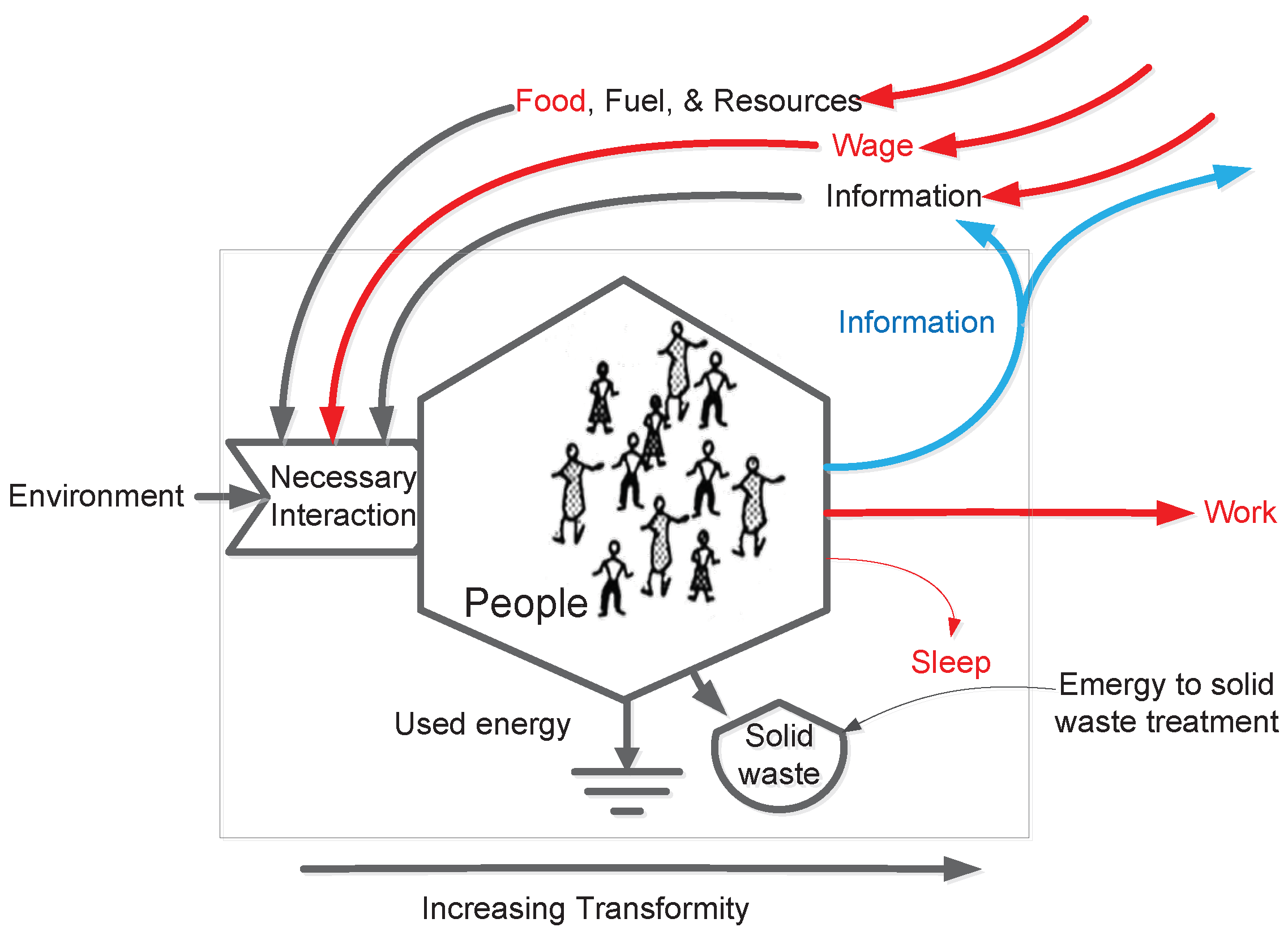
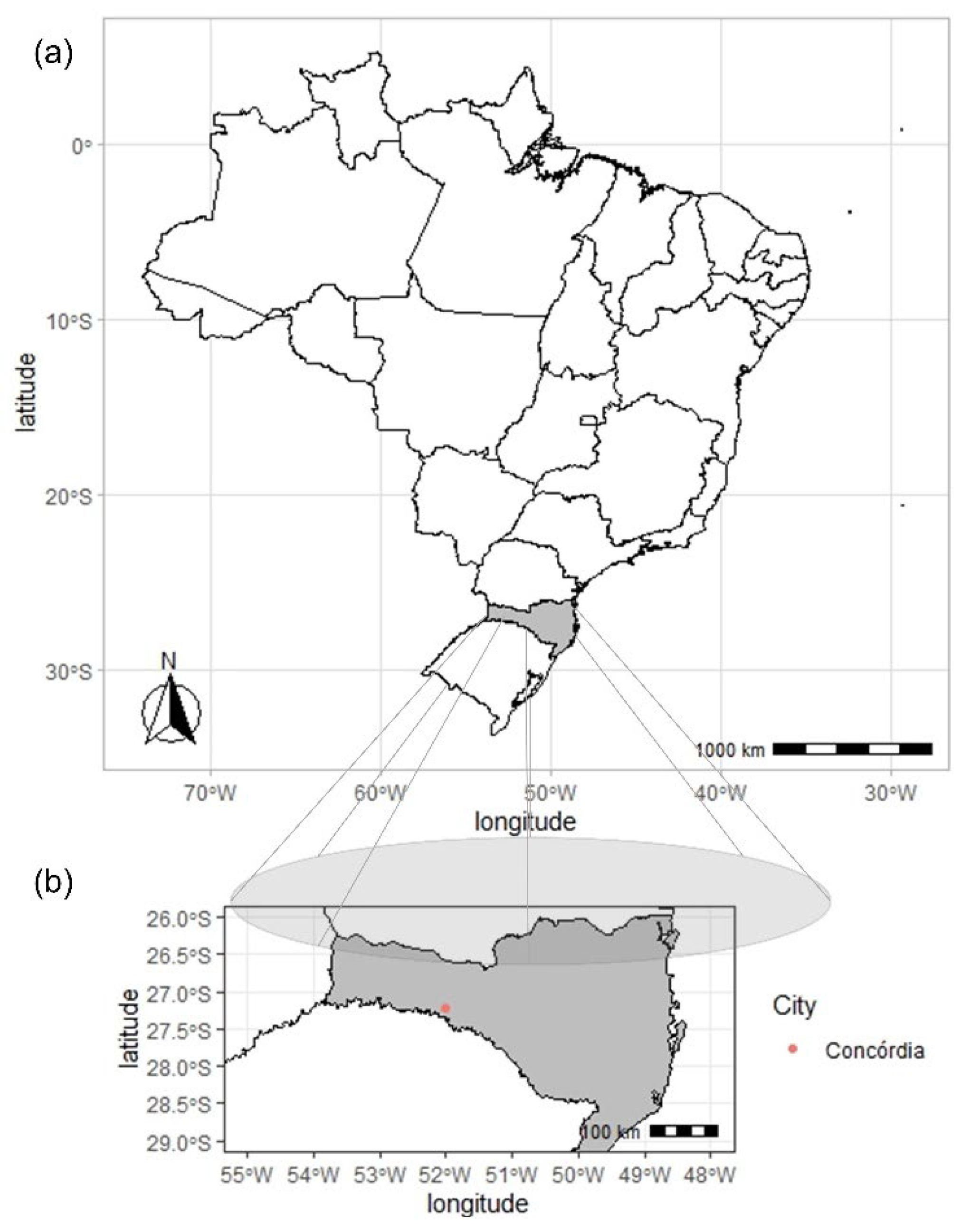
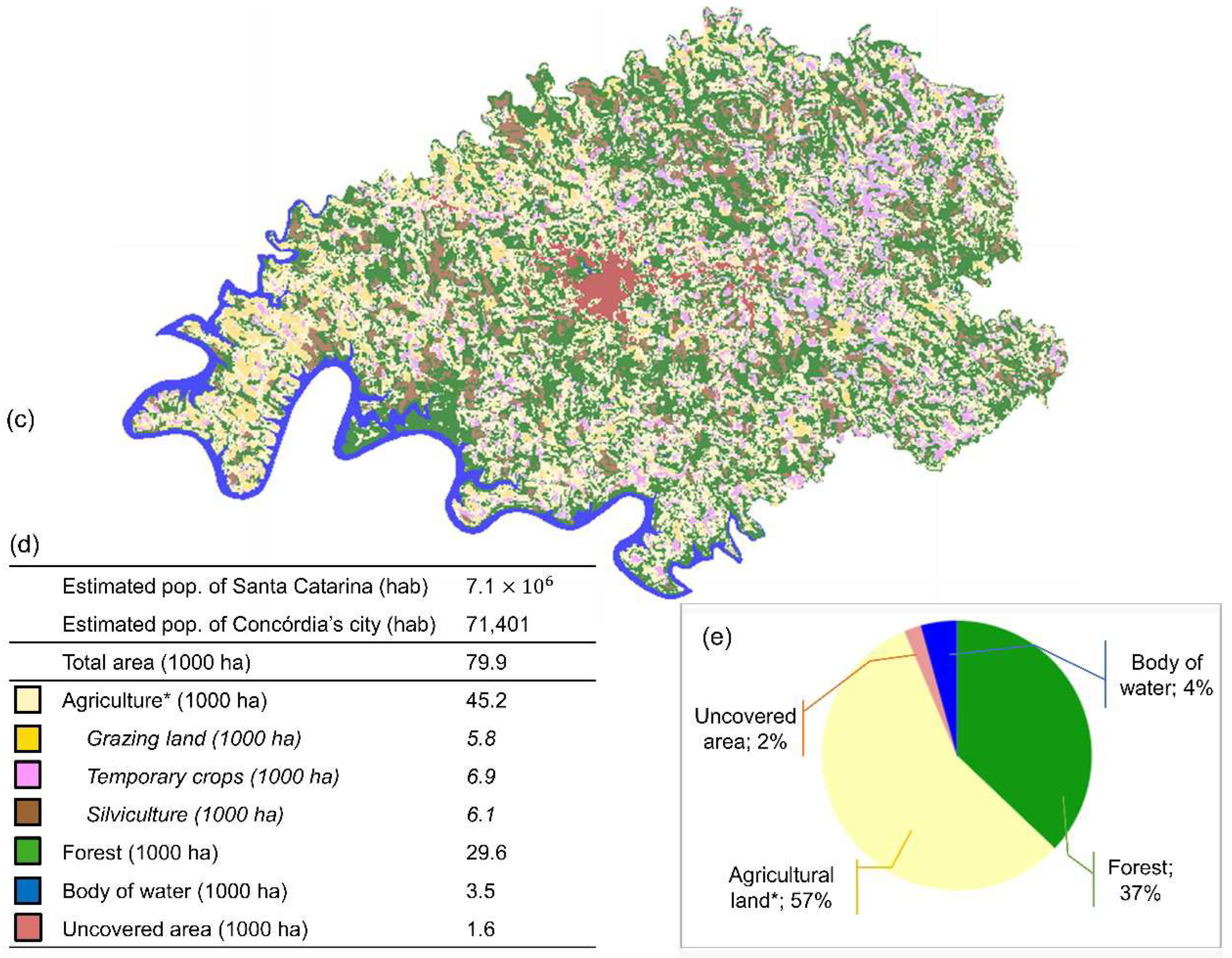
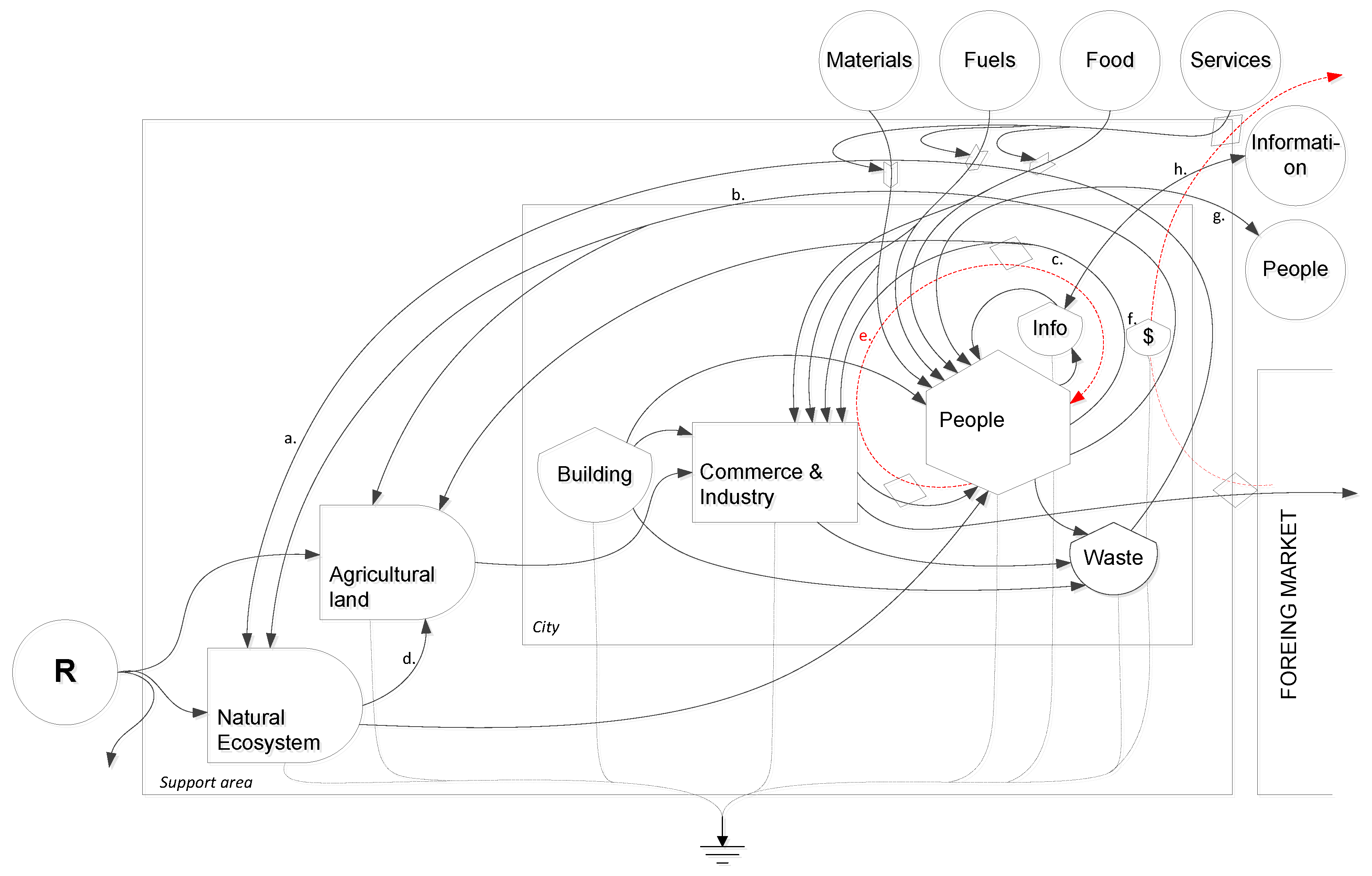
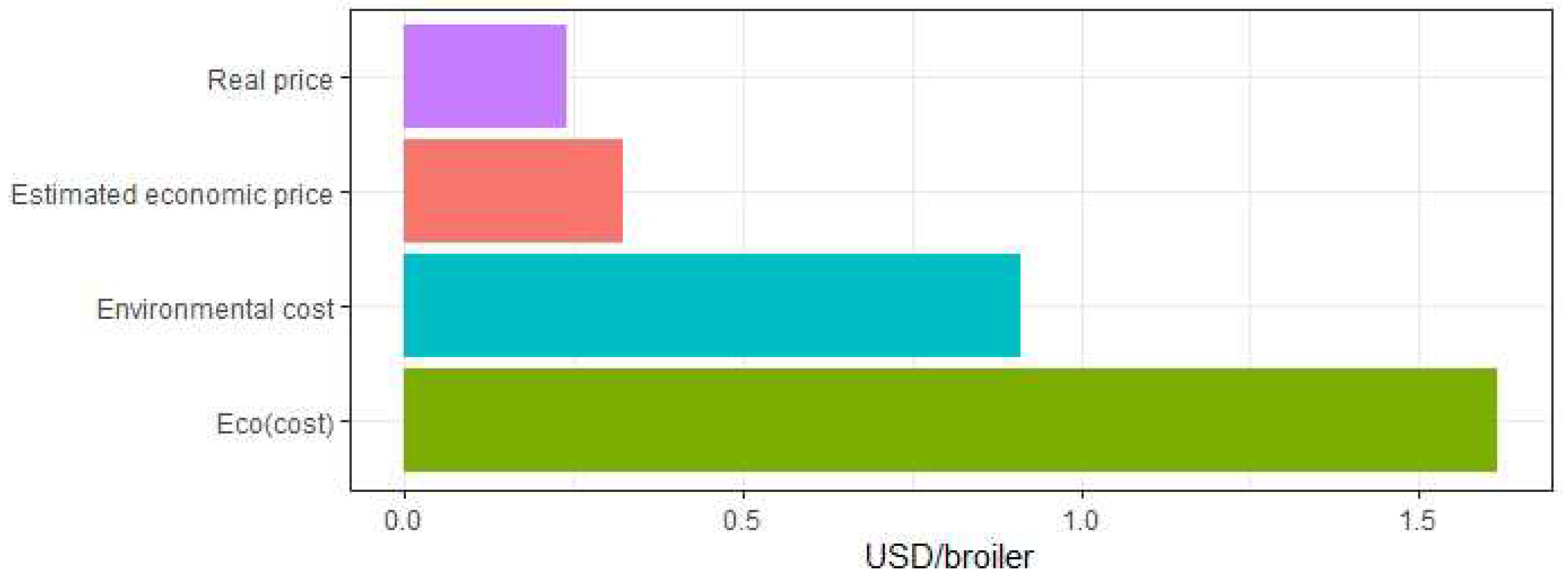
| Solar | Em$ | |||||||
|---|---|---|---|---|---|---|---|---|
| Data | Transformity | EMERGY | Value (sej/$.yr) | |||||
| Item | Unit | (units/yr) | (sej/unit) | ( sej/yr) | 2018 | % | ||
| ENVIRONMENT RESOURCES (considering kinetic wind and Earth cycle Emergy contrib.; Emergy per person) | ** | 0.37 | 1.55 | 0.00 | ||||
| RESOURCES CONSUMPTION | 19,828.42 | 84,161.36 | 78.20 | |||||
| Food | J | 3.06 | 1.52 | a | 46.45 | 197.15 | 0.18 | |
| Electric power | J | 1.12 | 6.45 | b | 0.07 | 0.31 | 0.00 | |
| Fuel | J | 2.92 | 1.41 | c | 411.73 | 1,747.58 | 1.62 | |
| Natural gas | J | 9.66 | 2.90 | b | 0.28 | 1.19 | 0.00 | |
| Ethanol | J | 2.12 | 1.41 | c | 2.99 | 12.70 | 0.01 | |
| Information | ||||||||
| Cultural information | J | 5.77 | 2.77 | Table 1 | 15,961.45 | 67,748.08 | 62.95 | |
| Educational information | J | 9.84 | 3.46 | b | 3,405.45 | 14,454.36 | 13.43 | |
| MONETARY FLOW | ||||||||
| Wage | USD | 2.22 | 2.36 | e | 5,228.87 | 22,193.86 | 20.62 | |
| PRODUCED WASTE | ||||||||
| Solid waste treatment | J | 1.30 | 2.29 | f | 298.31 | 1266.19 | 1.18 | |
| OUTPUTS* | ||||||||
| Product | ||||||||
| Work | J | 1.47 | 1.73 | 25,355.97 | 107,622.96 | 100.00 | ||
| Coproducts | ||||||||
| Sleep | J | 5.50 | 4.61 | 25,355.97 | ||||
| Leisure | J | 3.82 | 6.64 | 25,355.97 | ||||
| w/ Ci | w/o Ci | |||||||||||
|---|---|---|---|---|---|---|---|---|---|---|---|---|
| Name of Index | Expression | Unit | Total | Agroindustry | Producer | Total | Agroindustry | Producer | ||||
| Emergy | R+N+F | sej/yr | 1.29 | 9.22 | 3.66 | 1.13 | 9.22 | 2.07 | ||||
| Broiler UEV | Y / Ep | J | 4.72 | 3.38 | 1.34 | 4.14 | 3.38 | 7.58 | ||||
| Litter (as fertilizer) UEV | Y / Ep | J | 3.68 | 2.64 | 1.05 | 3.23 | 2.64 | 5.91 | ||||
| Renewable resource from nature | (R) / (R+N+F) | % | 18% | 22% | 6% | 20% | 22% | 11% | ||||
| Non-renewable resource from nature | N/(R+N+F) | % | 0% | 0% | 0% | 0 | 0% | 0% | ||||
| Non-renewable purchase resources | (F)/(R+N+F) | % | 82% | 78% | 94% | 80% | 78% | 89% | ||||
| Environmental Loading Ratio | (N+FN)/(R+FR) | sej/sej | 4.65 | 3.49 | 15.01 | 3.95 | 3.49 | 8.04 | ||||
| Emergy Investment Ratio | (F) / (N + R) | sej/sej | 5,496.66 | - | 1,562.05 | 4,815.69 | - | 881.08 | ||||
| Emergy Yield Ratio | Y / (FN) | sej/sej | 1.22 | 1.29 | 1.07 | 1.25 | 1.29 | 1.12 | ||||
| Emergy Sustainability Index | EYR / ELR | sej/sej | 0.26 | 0.37 | 0.07 | 0.32 | 0.37 | 0.14 | ||||
| Emergy Exchange Ratio | Y / ($) (sej/$) | sej/sej | 2.08 | 1.49 | 0.59 | 1.82 | 1.49 | 0.33 | ||||
| Emergy Exchange Ratio (producer) | Yproducer / ($/bird) (sej/$) | 1.00 | 1.00 | |||||||||
| if EER = 1.0 | USD/bird | 1.61 | 0.91 | |||||||||
Disclaimer/Publisher’s Note: The statements, opinions and data contained in all publications are solely those of the individual author(s) and contributor(s) and not of MDPI and/or the editor(s). MDPI and/or the editor(s) disclaim responsibility for any injury to people or property resulting from any ideas, methods, instructions or products referred to in the content. |
© 2023 by the authors. Licensee MDPI, Basel, Switzerland. This article is an open access article distributed under the terms and conditions of the Creative Commons Attribution (CC BY) license (http://creativecommons.org/licenses/by/4.0/).





